Page 91 • (1,236 results in 0.028 seconds)
-

identity as a first-generation Latina student and her upbringing. “I just want to show my family that their sacrifice was worth it all,” she says, “because I can do more and give back that love and support that they’ve given me unconditionally.” She’s also grateful for the support of the tight-knit community at PLU. As a Franklin Pierce High School student taking classes at PLU, she felt a sense of belonging even before starting college—but she hadn’t realized that the university was also a place where
-
jewelry design, to rapid prototyping and graphic design. At PLU, an obvious use of the software is in sculpture classes. Artists typically construct a scaled-down, 3-D model of their sculpture first in cardboard or clay, but editing the model is labor-intensive, Ebbinga said. In Rhino, artists can create the model and easily make adjustments. The software can also be used in math courses. Ebbinga is currently collaborating with associate math professor Daniel Heath, who studies complex knots. The
-
pointed out artwork on campus. “We want to highlight PLU as a whole,” explained co-chair Allie Moore. Other events included a discussion with former KOMO 4 news reporter John Sharify and the MediaLab Open House, which showcased senior Tove Tupper’s documentary “Keeping the Rhythm: The Story of the DASH Center.” Additionally, PLU faculty members hosted a variety of classes and workshops, from drawing, pottery and playwriting to resume and portfolio tips. Alumni also spoke about life after PLU, and
-
having a zero carbon footprint by 2020, and what each was doing to try to achieve that end. Professors also spoke on how they try to reinforce the message of sustainability in their respective fields and classes. One of the biggest challenges is to bring home the environmental impact of everyday habits, noted Brian Naasz, assistant chemistry professor and chair of PLU’s sustainability committee. Naasz recalled the blank looks he received from a class when he asked them where the power comes from to
-

a fee of no more than $50 a semester. The goal, after all, is to get people bicycling – not make money. The co-op will be more than just rentals. “The ultimate goal of the co-op is to develop more of a bicycle culture on campus,” said Pfaff. With that goal in mind, Pfaff says the co-op will offer short classes for everyone on simple bike maintenance, like repairing a flat or fixing a chain. He also plans to have accessible bike pumps available at the co-op, which will be housed in the Outdoor
-
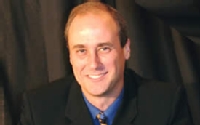
served for many seasons as a chamber music performer and coach at the Victoria International Festival in Victoria, Canada, and as staff accompanist at The Juilliard School. He has taught previously at the Brooklyn Conservatory of Music and has given master classes at the Beijing Central Conservatory, Shanghai Conservatory, and the Chinese Cultural University in Taipei, Taiwan. He continues to be in great demand as a collaborating pianist. Bennett will join the PLU faculty this summer. Read Previous
-
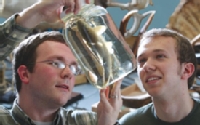
classes they will take are Biology 125 and 126. The two-semester set, called the biology introductory core sequence, seeks to lay the educational foundation for the many students who hope to enter fields of biological study including the medical profession. Sean Boaglio ’13 is one of those students. He says he’s seen a lot of students – the best at their high schools – have difficulty adjusting to the intensity of the coursework. It is just so different from high school. “You really have to connect
-
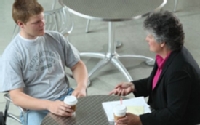
very impressed with the quality of the ideas that the students develop and how realistic their business plans are.” According to Jim Brock, dean of the School of Business, it is the way all the faculty members conduct their classes. Professors focus on making sure students have every opportunity to get important hands-on experience. “We encourage students to be active learners, taking advantage of the opportunities we work to put before them, including participating in our mentor program and
-
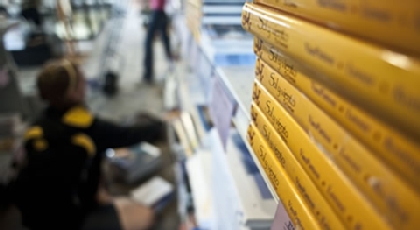
before it went live in mid-August. “They can buy a used book, purchase a new book here, or participate through the buyback program.” Under the buyback program, if a book is a current edition, adopted for an upcoming term at PLU, and the bookstore needs those copies, students can receive up to 50 percent of the new sell price for the book. In other cases, the price is based on the national wholesale demand for the book. Most of the students begin purchasing their books two weeks before classes start
-
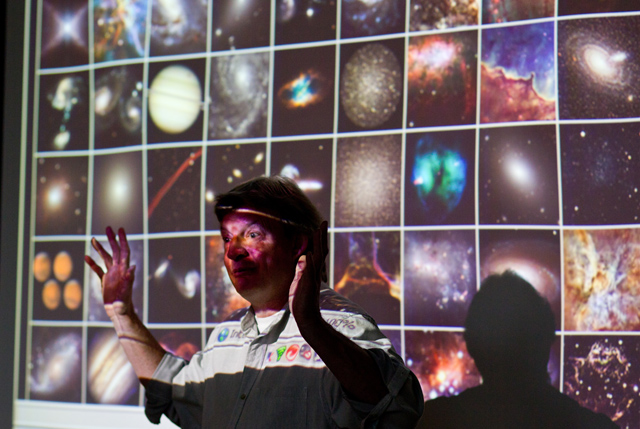
Space Telescope in the community room of the Garfield Book Company last Monday. “The Hubble Space Telescope allows us to observe the heavens at the farthest distances that are possible,” he said. “We really are celestial beings. We’re connected to the heavens and creation in a way you might not imagine.” The lecture was part of the L.I.F.E program, which provides opportunities for mature adults, with the aim of enhancing their personal development with stimulating educational classes. The idea for
Do you have any feedback for us? If so, feel free to use our Feedback Form.


